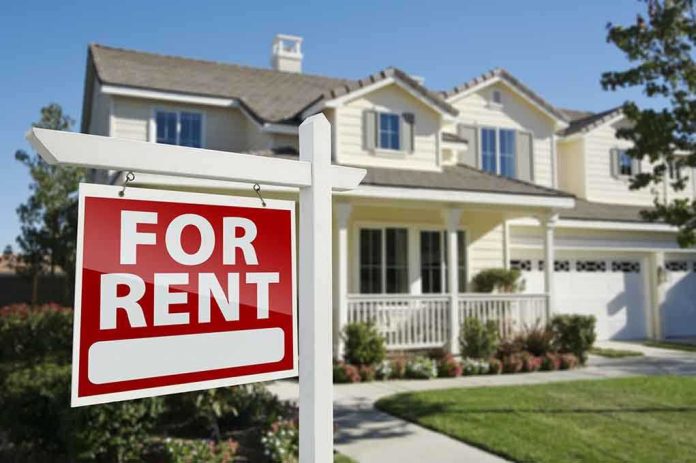
Mom-and-pop landlords warn that a proposed NYC rent freeze could devastate property values and drive small owners out of the market, sparking fears of unsellable homes and eroding property rights.
Story Snapshot
- Zohran Mamdani’s rent freeze proposal has alarmed small NYC landlords, who fear it will destroy their financial stability.
- Tenant advocates support the freeze, citing the city’s severe affordability crisis for renters.
- Incumbent Mayor Eric Adams and former Governor Cuomo oppose the freeze, arguing it threatens housing quality and property rights.
- The Rent Guidelines Board will cast a crucial vote on rent increases, with lasting implications for tenants and landlords.
Rent Freeze Proposal Sparks Outcry Among Small Landlords
Zohran Mamdani, NYC’s Democratic mayoral nominee, has made a citywide rent freeze for rent-stabilized apartments a central campaign promise. This proposal has ignited intense anxiety among small, independent landlords—many of whom rely on rental income to maintain their properties and support their families. Landlords warn that a freeze would lock them into fixed, below-market rents, making it difficult to cover rising costs, perform necessary maintenance, or sell their properties. The prospect of unsellable homes is described as “the kiss of death,” heightening fears of financial ruin and long-term loss of property rights.
Tenant Bloc, a grassroots advocacy group, has played a key role in mobilizing support for the rent freeze, organizing tenants and framing the debate as a battle for affordability and housing security. With renters comprising over two-thirds of NYC’s population, tenant groups argue that a freeze is necessary to prevent displacement and stabilize communities. The campaign’s momentum has shifted the political landscape, making rent regulation a focal point of the mayoral race. However, many small landlords—often minority and family-owned—feel sidelined in the discussion, warning that the freeze could force them to defer maintenance or exit the market entirely.
Political Opposition and Counterproposals Shape Debate
Incumbent Mayor Eric Adams, now running as an independent, has positioned himself as a defender of small landlords and housing quality. Adams strongly opposes the rent freeze, urging the Rent Guidelines Board (RGB) to adopt the lowest possible rent increase but warning that a full freeze undermines property rights and risks neglecting building upkeep. Former Governor Andrew Cuomo has entered the fray with “Zohran’s Law,” a counterproposal that advocates means-testing for rent-stabilized units, targeting relief to lower-income renters instead of blanket freezes. Both Adams and Cuomo argue that Mamdani’s approach is poorly designed and could backfire on vulnerable property owners.
The RGB, appointed by the mayor, is scheduled to vote on rent increases for nearly one million stabilized units—a decision that will have significant consequences for both tenants and landlords. Public hearings and advocacy campaigns continue to intensify, with stakeholders on both sides seeking to influence the outcome. Political power dynamics are at play, as tenant groups increase their influence while small landlords voice concerns about being squeezed out of NYC’s housing market.
Economic and Social Impact: Risks to Property Values and Housing Quality
If enacted, the rent freeze would immediately halt increases for over a million apartments, offering short-term relief for tenants facing rising costs and eviction threats. However, small landlords warn of dire financial strain, with reduced rental income threatening their ability to pay for repairs, taxes, and mortgage obligations. Over time, experts caution that housing quality may deteriorate if owners defer maintenance, and the risk of “unsellable” properties could prompt many to leave the market. This exodus could consolidate ownership under larger firms, potentially reducing competition and community stability. The debate highlights the tension between affordability for renters and sustainability for property owners—an issue at the heart of NYC’s housing crisis.
Mom-and-pop NYC landlords fear getting stuck with unsellable properties if Mamdani wins: ‘The kiss of death’ https://t.co/TQkr1ot94W pic.twitter.com/AgjXOjxncg
— New York Post (@nypost) August 27, 2025
The wider economic impact could include declining property values in rent-regulated buildings, reduced investment in NYC real estate, and ripple effects on market-rate rents. Socially, while tenant stability may improve in the short term, the long-term risk of neglected properties and fewer small landlords could undercut neighborhood cohesion. Politically, the tenant movement’s rise marks a shift in city power dynamics, but unresolved questions remain about how to balance tenant protections with incentives for responsible property ownership.
Expert Perspectives and Source Analysis
Industry experts and analysts present sharply divided views. Tenant advocates insist a rent freeze is essential to prevent displacement and protect vulnerable residents, citing the city’s affordability crisis. Conversely, economists, landlord organizations, and some policymakers warn that freezing rents undermines property rights, erodes the financial base for small landlords, and threatens the maintenance of aging housing stock. The NYU Furman Center notes that rent-stabilized buildings already face challenges due to low rents, and further restrictions could worsen physical distress. Commercial real estate analysts flag the risk of declining investment and market instability. The debate continues, with credible coverage from Shelterforce, amNewYork, City & State NY, Trepp, and NYU Furman Center underpinning the facts and perspectives shaping NYC’s housing policy crossroads.
Sources:
What Zohran Mamdani’s Primary Win Means for the Tenant Movement (Shelterforce)
What Would a Rent Freeze Mean for NYC? (amNewYork)
NYC Mayoral Proposals Raise Concerns for Rent-Regulated CRE (Trepp)
Freeze Rent: How Many Apartments, Exactly? (City & State NY)







